Fleurs du Mal Magazine


Or see the index
Kingdomland is the debut poetry collection of Rachael Allen – a writer of rare vision and flair.
The world she creates is suffused with surreal images and uncanny incidents. Unexplained violences and strange metamorphoses take shape in the ‘glowering dusk’. And yet, all too clearly, we recognise life here on earth, its everyday griefs, dysfunctions and injustices.
 Where distinctions between murder and bloodletting, corruption and consumption are blurred. Where a pet tarantula or mimic octopus might find itself beside glands and processed meats. Landscapes shift and identities dissolve: ‘the red bricks of the day’ exist ‘in a woman’s chest’, a human presence is ’embedded in the walls’. All appears changed, but familiar.
Where distinctions between murder and bloodletting, corruption and consumption are blurred. Where a pet tarantula or mimic octopus might find itself beside glands and processed meats. Landscapes shift and identities dissolve: ‘the red bricks of the day’ exist ‘in a woman’s chest’, a human presence is ’embedded in the walls’. All appears changed, but familiar.
Intercut with oblique verse fragments and a series of linked sequences, Allen blends elements of fiction and ekphrasis to create a haunting and unforgettable debut.
Rachael Allen was born in Cornwall and studied at Goldsmiths College. She is the co-author of Jolene, a book of poems and photographs with Guy Gormley, and Nights of Poor Sleep, a book of poems and paintings with Marie Jacotey. She has received a Northern Writers’ Award and an Eric Gregory Award, and was made a Faber New Poet in 2014. She is poetry editor at Granta and co-founder of the poetry press clinic and online journal tender.
( . . . )
The white ocean spreads itself
like the badly iced top of a cake
seen through the smeared Plexiglas
of a cheap hotel restaurant.
I grate flesh into garlanded toilet water,
rearrangements of a desiccated sky.
( . . . )
# new poetry
Kingdomland
by Rachael Allen (Author)
Paperback
80 pages
Publisher: Faber & Faber
Main edition
17 Jan. 2019
Language : English
ISBN-10 : 057134111X
ISBN-13 : 978-0571341115
Dimensions: 12.7 x 0.76 x 19.3 cm
€ 18,99
•fleursdumal.nl magazine
More in: #Editors Choice Archiv, - Book News, Archive A-B, Archive A-B
Winkelstraat in Tilburg
Armoei, kindersterfte, dwangarbeid en hei
bestaan niet meer. We zijn van winters wei-
en zomers hooiland helemaal vervreemd, en
wat ooit de verschillen waren tussen beemd
en eeuwsel, niemand weet het meer. De tijd
liet de gemene gronden van het nageslacht
alleen wat weemoed na, een soort respijt,
een voorgevoel. Alsof er wordt gewacht.
Paul Bezembinder
Winkelstraat in Tilburg
Gedicht
Paul Bezembinder studeerde theoretische natuurkunde in Nijmegen. In zijn poëzie zoekt hij vooral in klassieke versvormen en thema’s naar de balans tussen serieuze poëzie, pastiche en smartlap. Zijn gedichten en vertalingen (Russisch-Nederlands) verschenen in verschillende (online) literaire tijdschriften. Bundels: Kwatrijnen (Fantom E-books, 2018), Gedichten (2020, heruitgave), Parkzicht (2020). Meer voorbeelden van zijn werk vindt u op: www.paulbezembinder.nl.
• fleursdumal.nl magazine
More in: #Editors Choice Archiv, Archive A-B, Archive A-B, Bezembinder, Paul

And Yet
They drew him from the darkened room,
Where, swooning in a peace profound,
Beneath a heavy fragrance drowned
Her grey form glimmered in the gloom.
Death smoothed from her each sordid trace
Of Life; at last he read the scroll;
For all the meaning of her soul
Flowered upon her perfect face.
“In other worlds her soul finds scope;
Her spirit lives; she is not dead,”
In his dulled ear they said and said,
Suave-murmuring the ancient Hope.
“You loved her; she was worthy love.
Think you her spheral soul can cease?
Nay, she has ripened to release
From this bare earth, and waits above.”
His brain their clamour heard aloof;
He, too, had said the self-same thing;
But now his heart was quivering
For more than comfort — parched for proof.
He put them from him. “Let me be;
You proffer in my bitter need
The coward comfort of a creed
That tears her soul apart from me.
“She waits in no drear Heaven afar.
Her woman’s soul in all its worth,
Yearning for me, for homely earth,
No gates of beaten gold could bar.
“No, she is near me, ever close;
One with the world, but free again;
One with the breezes and the rain;
One with the mountain and the rose.
“She knows me not; her voice is dumb;
But aching through the twilight peers,
And, unremembering, yet with tears,
She strives to say she cannot come.
“Yes, she is changed, but not destroyed;
The words that were her soul are hushed;
The gem that was her heart is crushed —
Its fragments white stars in the void.
“And I shall see her in disguise;
In the grey vistas of the street
A face that hints of her I meet;
Whispers her soul from alien eyes.
“In Time’s great garden, spring on spring,
The blossoms glow; then at a breath
Their petals flutter down to death —
Ah love, how brief your blossoming!
“Death has but severed part from part.
Borne on an ever-moving air
The fragrance of her life somewhere
Freshens some lonely wistful heart!
“No word of hers can God forget;
Her laughter Time dare not disperse;
It shakes the tense-strung universe,
And with the chord it trembles yet.
“Each mood of hers, each fancy slight,
In deep pulsations, ring on ring,
Dilating, ever-widening,
Ripples across the outer night.
“Her life with deathless charm was fraught,
And God with smiles remembers now
The puzzled pucker of her brow
Ruffled with sudden gusts of thought.
“And in His cosmic memory wise
Still live her subtle features thin,
Her dear iconoclastic chin,
The grave enigma of her eyes.
“And if beyond she might draw breath.
And know that I was not with her,
The wistful eyes of her despair
Would be more desolate than death.
“But not to meet her in the wide
Night-spaces I must wander through;
To kiss the pretty pout I knew,
And nevermore to hear her chide;
“To speak those childish words that were
So foolish-sweet, so passionate-wise;
Her subtle fragrance recognise
And hear the whispers of her hair! . . .
“Her sun has set; but still, sublime,
She is a star, of God a part;
She is a petal at the heart
Of the eternal flower of Time.
“I triumph so beyond regret,
I win her immortality:
Where, Death, your vaunted victory?
Where, Grave, your sting? And yet — and yet——!”
Arthur Adams
(1872-1936)
And Yet
• fleursdumal.nl magazine
More in: Adams, Arthur, Archive A-B, Archive A-B
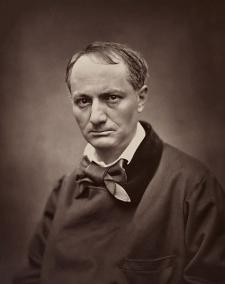
Je n’ai pas oublié,
voisine de la ville
Je n’ai pas oublié, voisine de la ville,
Notre blanche maison, petite mais tranquille;
Sa Pomone de plâtre et sa vieille Vénus
Dans un bosquet chétif cachant leurs membres nus,
Et le soleil, le soir, ruisselant et superbe,
Qui, derrière la vitre où se brisait sa gerbe
Semblait, grand oeil ouvert dans le ciel curieux,
Contempler nos dîners longs et silencieux,
Répandant largement ses beaux reflets de cierge
Sur la nappe frugale et les rideaux de serge.
Charles Baudelaire
(1821 – 1867)
Je n’ai pas oublié, voisine de la ville
Fleurs du mal (Flowers of Evil)
• fleursdumal.nl magazine
More in: Archive A-B, Archive A-B, Baudelaire, Les Fleurs du Mal
Born in New Zealand in 1934, Fleur Adcock spent the war years in England, returning with her family to New Zealand in 1947.
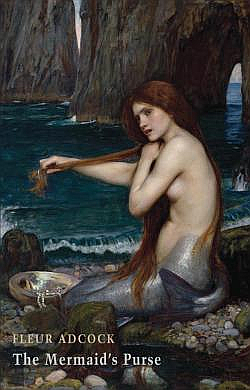 She emigrated to Britain in 1963, working as a librarian in London until 1979. In 1977-78 Fleur Adcock was writer-in-residence at Charlotte Mason College of Education, Ambleside.
She emigrated to Britain in 1963, working as a librarian in London until 1979. In 1977-78 Fleur Adcock was writer-in-residence at Charlotte Mason College of Education, Ambleside.
Fleur Adcock was Northern Arts Literary Fellow in 1979-81, living in Newcastle, becoming a freelance writer after her return to London.
She received an OBE in 1996, and the Queen’s Gold Medal for Poetry in 2006 for Poems 1960-2000 (Bloodaxe Books, 2000).
Fleur Adcock published three pamphlets with Bloodaxe: Below Loughrigg (1979), Hotspur (1986) and Meeting the Comet (1988), as well as her translations of medieval Latin lyrics, The Virgin & the Nightingale (1983).
She also published two translations of Romanian poets with Oxford University Press, Orient Express by Grete Tartler (1989) and Letters from Darkness by Daniela Crasnaru (1994).
All her other collections were published by Oxford University Press until they shut down their poetry list in 1999, after which Bloodaxe published her collected poems Poems 1960-2000 (2000), followed by Dragon Talk (2010), Glass Wings (2013), The Land Ballot (2015) and Hoard (2017).
The Mermaid’s Purse is due from Bloodaxe in 2021. Poems 1960-2000 and Hoard are Poetry Book Society Special Commendations while Glass Wings is a Poetry Book Society Recommendation. In October 2019 Fleur Adcock was presented with the New Zealand Prime Minister’s Award for Literary Achievement in Poetry 2019 by the Rt Hon Jacinda Ardern.
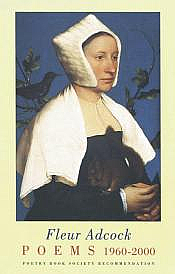 Fleur Adcock writes about men and women, childhood, identity, roots and rootlessness, memory and loss, animals and dreams, as well as our interactions with nature and place. Her poised, ironic poems are remarkable for their wry wit, conversational tone and psychological insight, unmasking the deceptions of love or unravelling family lives.
Fleur Adcock writes about men and women, childhood, identity, roots and rootlessness, memory and loss, animals and dreams, as well as our interactions with nature and place. Her poised, ironic poems are remarkable for their wry wit, conversational tone and psychological insight, unmasking the deceptions of love or unravelling family lives.
Fleur Adcock began writing the poems in this book when she was 82. The two chief settings are New Zealand, with its multi-coloured seas, and Britain, seen in various decades.
There are foreign travels, flirtations, family memories, deaths and conversations with the dead. Katherine Mansfield, incognito, dodges an academic conference; there’s a lesson in water divining as well as a rather unusual Christmas party.
We meet several varieties of small mammal, numerous birds, doomed or otherwise, and some sheep. The book ends with a sequence in memory of her friend, the poet Roy Fisher.
# new poetry
The Mermaid’s Purse
by Fleur Adcock
Publication Date : 25 Feb 2021
Pages: 80
Size: 234 x 156mm
ISBN: 9781780375700
Paperback
£10.99
• fleursdumal.nl magazine
More in: #Modern Poetry Archive, Archive A-B, Archive A-B, Mermaids
![]()
Notitie,
gevonden in een conservatorium
Ik weet wel dat mijn stiltes pijnlijk zijn,
vandaar dat ik niet ieder stuk nog speel.
Een rust in mijn 4’33” wordt niet zelden
ook de doorgewinterd luisteraar te veel.
Paul Bezembinder
Notitie, gevonden in een conservatorium
Gedicht
(Meer over Paul Bezembinder is te vinden op zijn website: www.paulbezembinder.nl)
• fleursdumal.nl magazine
More in: # Music Archive, Archive A-B, Archive A-B, Bezembinder, Paul

Sydney
In her grey majesty of ancient stone
She queens it proudly, though the sun’s caress
Her piteous cheeks, ravished of bloom, confess,
And her dark eyes his bridegroom glance have know.
Robed in her flowing parks, serene, alone,
She fronts the east; and with the tropic stress
Her smooth brow ripples into weariness;
Yet hers the sea for footstool, and for throne
A continent predestined. Round her trails
The turbid squalor of her streets, and dim
Into the dark heat-haze her domes flow up;
Her long lean fingers, with their grey-old nails,
Giving her thirsty lips to the cool brim
Of the bronze beauty of her harbour’s cup.
Arthur Adams
(1872-1936)
Sydney
• fleursdumal.nl magazine
More in: Adams, Arthur, Archive A-B, Archive A-B

Rondeel
Zong ik mijn lief een liedekijn,
ik koos een mooie, zware brom,
ik zong van jeugd en ouderdom,
en dat het fijn voor ons zou zijn.
Van cocktails en van ambrozijn,
van slapen saam en kerels stom
zong ik mijn lief een liedekijn –
ik koos een mooie, zware brom.
Van instrument, muziek, refrein,
van slagwerk en van stille trom,
van ochtendlicht en ouderdom
zong ik een liedje klein en fijn,
zong ik mijn lief een liedekijn.
Paul Bezembinder
Rondeel
Gedicht
(Meer over Paul Bezembinder is te vinden op zijn website: www.paulbezembinder.nl)
• fleursdumal.nl magazine
More in: #Editors Choice Archiv, Archive A-B, Archive A-B, Bezembinder, Paul

Dichterschap
Hij gaf verdwenen talen. Aan een school
in Rotterdam. Daaruit ontstond misschien
die diepe eenzaamheid die in hem school,
de angst dat iemand hem zou willen zien
om wie hij was, – om wie hij had te zijn,
een fluisteraar van oude stemmen zacht
die zich in peppels om de woning klein
verstopten voor de stiltes van de nacht.
Paul Bezembinder
Dichterschap
Gedicht
Foto: J.H. Leopold (1865 – 1925)
Paul Bezembinder studeerde theoretische natuurkunde in Nijmegen. In zijn poëzie zoekt hij vooral in klassieke versvormen en thema’s naar de balans tussen serieuze poëzie, pastiche en smartlap. Zijn gedichten en vertalingen (Russisch-Nederlands) verschenen in verschillende (online) literaire tijdschriften. Bundels: Kwatrijnen (Fantom E-books, 2018), Gedichten (2020, heruitgave), Parkzicht (2020). Meer voorbeelden van zijn werk vindt u op: www.paulbezembinder.nl.
• fleursdumal.nl magazine
More in: #Editors Choice Archiv, Archive A-B, Archive A-B, Bezembinder, Paul, Leopold, J.H.
A timeless, visionary collection of poems from one of China’s most acclaimed poets-now available in English for the first time in a generation and featuring a foreword by his son, contemporary artist and activist Ai Weiwei
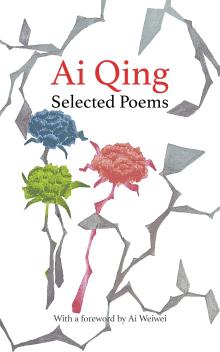 One of the most influential poets in Chinese history, Ai Qing is mostly unknown to Western readers, but his work has shaped the nature of poetry in China for decades. Born between the fall of imperial Manchurian rule and the establishment of the Communist People’s Republic, Ai Qing was at one time an intimate of Mao Zedong.
One of the most influential poets in Chinese history, Ai Qing is mostly unknown to Western readers, but his work has shaped the nature of poetry in China for decades. Born between the fall of imperial Manchurian rule and the establishment of the Communist People’s Republic, Ai Qing was at one time an intimate of Mao Zedong.
He would eventually fall out with the leader and be sentenced to hard labor during the Cultural Revolution, when he was exiled to the remote part of the country known as “Little Siberia” with his family, including his son, Ai Weiwei.
In his work, Ai Qing tells the story of a China convulsing in change, leaving behind a legacy of feudalism and imperialism but uncertain what the future will hold. Breaking with traditional forms of Chinese poetry, Ai Qing innovatively adapted free verse, writing with a simple sincerity in clear lines that could be understood by everyday readers.
Selected Poems of Ai Qing is an extraordinary collection that traces the powerful inner life of this influential poet who crafted poems of protest, who longed for a newer, happier age, and who wrote with a profound lyricism that reaches deep into the heart of the reader.
Selected Poems by Ai Qing (Author),
Ai Weiwei (Introduction), Robert Dorsett (Translator)
Ai Qing is regarded as one of the finest modern Chinese poets, whose free verse was influential in the development of new poetry in China.
Ai Weiwei is one of the world’s most important living artists. Born in 1957, he lives in Cambridge, UK.
Allan H. Barr is the author of a study in Chinese of a literary inquisition in the early Qing dynasty, Jiangnan yijie: Qing ren bixia de Zhuangshi shi’an, and the translator of several books by contemporary Chinese authors, including Yu Hua’s China in Ten Words and Han Han’s This Generation. He teaches Chinese at Pomona College in California.
# new poetry
Selected Poems by Ai Qing (Author),
Ai Weiwei (Introduction),
Robert Dorsett (Translator)
Publisher: Vintage Classics
2 Nov. 2021
Language: English
Hardcover
128 pages
ISBN-10: 1784877662
ISBN-13: 978-1784877668
£12.99
• fleursdumal.nl magazine
More in: #Editors Choice Archiv, #Modern Poetry Archive, - Book News, - Bookstores, Ai Weiwei, Archive A-B, Archive A-B

The Eviction
In early morning twilight, raw and chill,
Damp vapours brooding on the barren hill,
Through miles of mire in steady grave array
Threescore well-arm’d police pursue their way;
Each tall and bearded man a rifle swings,
And under each greatcoat a bayonet clings:
The Sheriff on his sturdy cob astride
Talks with the chief, who marches by their side,
And, creeping on behind them, Paudeen Dhu
Pretends his needful duty much to rue.
Six big-boned labourers, clad in common freize,
Walk in the midst, the Sheriff’s staunch allies;
Six crowbar men, from distant county brought, –
Orange, and glorying in their work, ’tis thought,
But wrongly,- churls of Catholics are they,
And merely hired at half a crown a day.
The hamlet clustering on its hill is seen,
A score of petty homesteads, dark and mean;
Poor always, not despairing until now;
Long used, as well as poverty knows how,
With life’s oppressive trifles to contend.
This day will bring its history to an end.
Moveless and grim against the cottage walls
Lean a few silent men: but someone calls
Far off; and then a child ‘without a stitch’
Runs out of doors, flies back with piercing screech,
And soon from house to house is heard the cry
Of female sorrow, swelling loud and high,
Which makes the men blaspheme between their teeth.
Meanwhile, o’er fence and watery field beneath,
The little army moves through drizzling rain;
A ‘Crowbar’ leads the Sheriff’s nag; the lane
Is enter’d, and their plashing tramp draws near,
One instant, outcry holds its breath to hear
“Halt!” – at the doors they form in double line,
And ranks of polish’d rifles wetly shine.
The Sheriff’s painful duty must be done;
He begs for quiet-and the work’s begun.
The strong stand ready; now appear the rest,
Girl, matron, grandsire, baby on the breast,
And Rosy’s thin face on a pallet borne;
A motley concourse, feeble and forlorn.
One old man, tears upon his wrinkled cheek,
Stands trembling on a threshold, tries to speak,
But, in defect of any word for this,
Mutely upon the doorpost prints a kiss,
Then passes out for ever. Through the crowd
The children run bewilder’d, wailing loud;
Where needed most, the men combine their aid;
And, last of all, is Oona forth convey’d,
Reclined in her accustom’d strawen chair,
Her aged eyelids closed, her thick white hair
Escaping from her cap; she feels the chill,
Looks round and murmurs, then again is still.
Now bring the remnants of each household fire;
On the wet ground the hissing coals expire;
And Paudeen Dhu, with meekly dismal face,
Receives the full possession of the place.
William Allingham
(1824 – 1889)
The Eviction
• fleursdumal.nl magazine
More in: Allingham, William, Archive A-B, Archive A-B
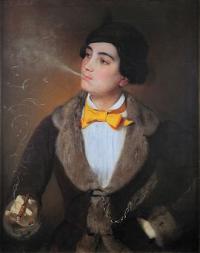
Dithyrambe
Glücklich, wem der Gott der Reben
Seine süßen Gaben beut,
Hüllend um das ganze Leben
Selige Vergessenheit!
Alle finstern Geister weichen,
Aller Fesseln sind wir los,
Herrscher in des Traumes Reichen,
Fühlt der Geist sich frei und groß.
Fort, mit deinen bleichen Zügen,
Träumende Erinnerung!
Deinen Zauber zu betrügen,
Fühl’ ich mächtig mich und jung!
Heiliger Entzückung Gluten
Fach’ ich in der Seele an;
Möchte frei das All’ umfluten,
Wie der alte Ocean!
Stürmt empor, ihr Jugendgeister!
Tanzt um mich in frohen Reih’n!
Immer frischer, immer dreister,
Stürzt ins Leben euch hinein!
Fluch den fremden, starren Mächten,
Die der Menschen Sinn betört;
Die uns martern, die uns knechten,
Die mein ganzes Sein zerstört!
Mächt’ger Gott der süßen Reben,
Spende mir Vergessenheit!
Schenke mir ein neues Leben,
Voll Genuß und Seligkeit!
Schlagt die Gläser all’ in Scherben:
So vergeh’ die alte Welt!
So mag sterben und verderben,
Was das Herz in Fesseln hält!
Louise Aston
(1814-1871)
Die wilde Rose
• fleursdumal.nl magazine
More in: # Classic Poetry Archive, Archive A-B, Archive A-B, Feminism
Thank you for reading Fleurs du Mal - magazine for art & literature